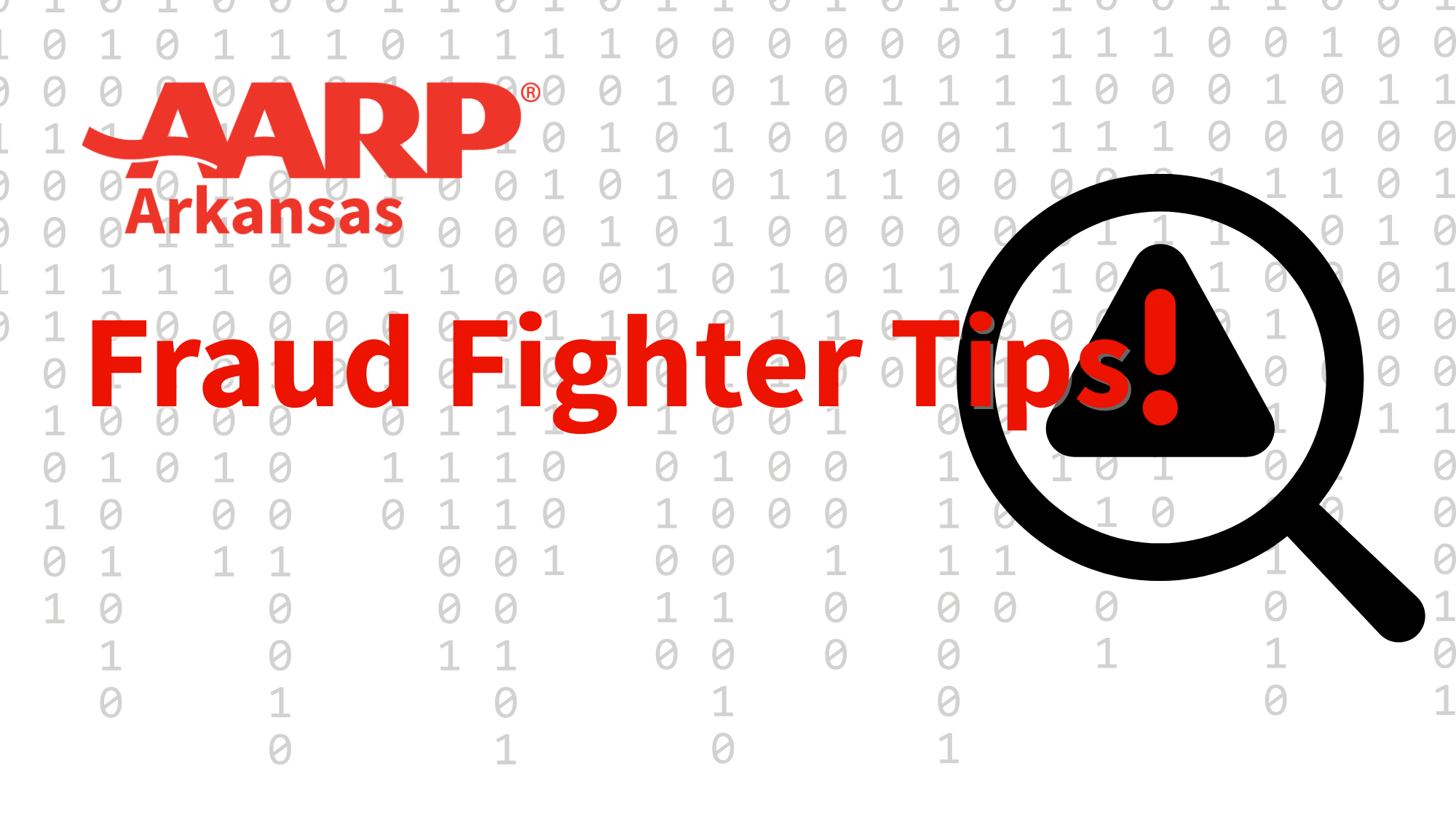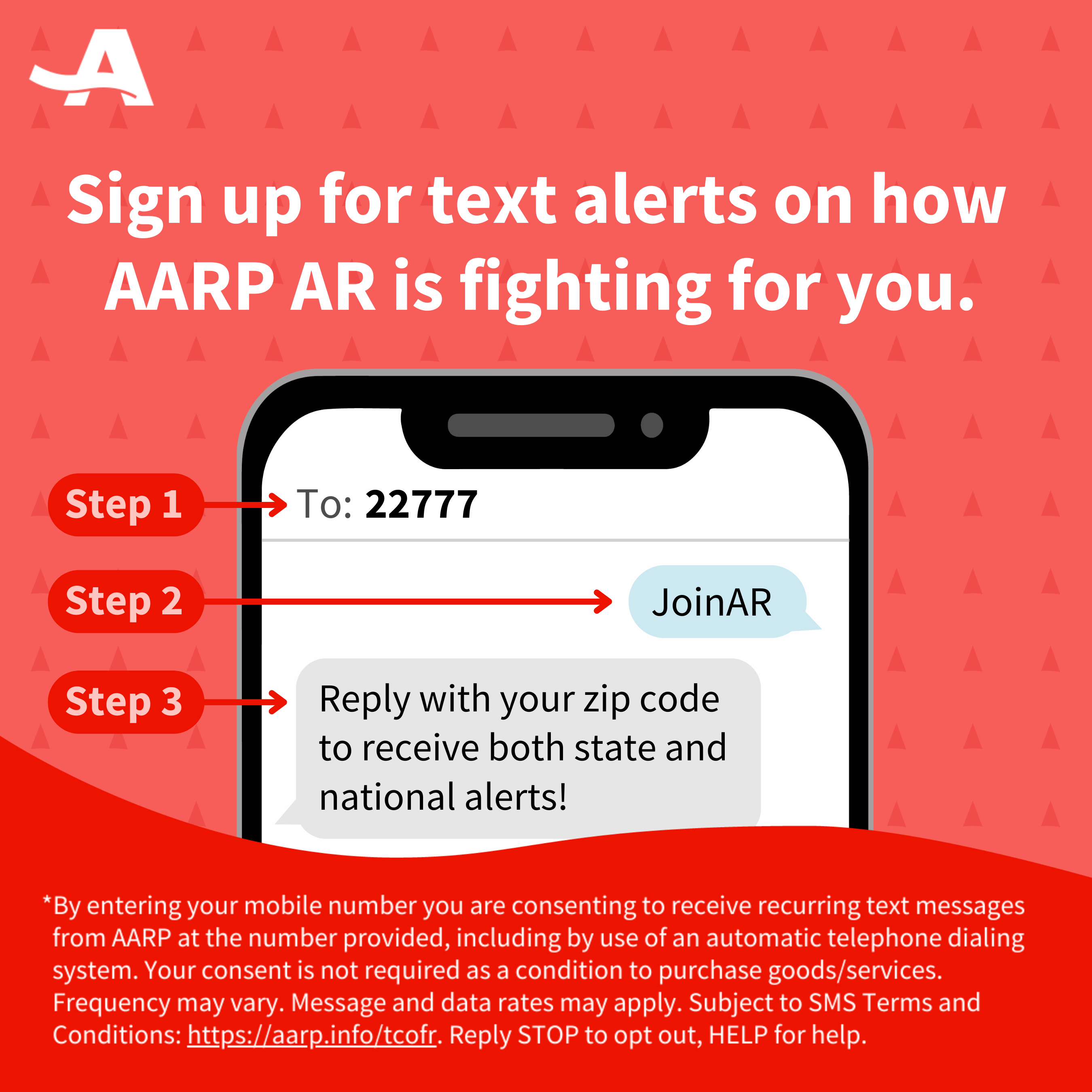AARP Hearing Center

Each month, AARP Arkansas sends out a fraud fighter text message that links to tips to help you stay scam aware and one step ahead of the con artists.
Would you like to be added to our text messages? Just text JoinAR to 22777.

Fake Jobs, Real Losses
If your New Year’s resolutions include finding a new job, work-from-home opportunities may sound appealing. While many remote positions are legitimate, some aren’t what they appear to be. Criminals often pose as legitimate employers on job boards, social media, or send unsolicited texts, promising easy money, flexible hours, and a quick hiring process.
What they’re really after is personal information or our money by asking to pay upfront for “training,” purchase expensive equipment, or provide sensitive details—such as your Social Security number—as part of the application.
Be cautious of sudden, unusually high-paying opportunities that require little to no experience. Avoid sharing personal data until you’re certain the job offer is legitimate and take time to research the company by searching its name along with the words scam, complaint, or fraud. If you see concerns from other job seekers, consider it a clear red flag.
Credit Repair Scams
With rising costs and economic uncertainty, many of us are looking to start the new year by taking more control of our finances and tackling lingering debt. But paying down what you owe takes time, discipline, and a clear plan—not quick fixes. Be cautious of offers that promise guaranteed results or fast debt elimination.
Scammers often target consumers with significant credit card debt, claiming they can negotiate with creditors to reduce what you owe. hThese operations typically charge hefty fees and deliver little—or no—help. Some even advise you to stop communicating with your creditors, which can make your situation worse.
If you or a loved one need help getting out of debt, turn to reputable organizations like the nonprofit National Foundation for Credit Counseling (www.nfcc.org). They can offer real guidance without hidden fees or false guarantees.
Utility Scams Heat Up During Colder Months
As temperatures drop in many states, criminals are turning up the heat on their deceptive tactics. While utility scams happen year-round, scammers are especially active when customers rely on these essential services to stay warm and safe.
They pose as utility companies, claiming you’re behind on your bill, and threatening to cut off service unless you make an immediate payment. Their goal is to trigger panic. When fear takes over, it becomes harder to think clearly, and they hope we stay in that state of panic just long enough to push through a payment.
If you receive an unexpected call claiming your service will be shut off, hang up. Then contact your utility provider directly using the customer service number on a recent bill or by logging into your account online. In most cases, you’ll find everything is in good standing.
Identity Theft Awareness Week
Each year, the Federal Trade Commission (FTC) leads Identity Theft Awareness Week, a national initiative held in late January on how to avoid identity theft, recover if it happens, and spot these scams before they occur.
Identity theft is when your personal information is exposed; identify fraud is when someone uses that data to take over or open accounts, steal your tax refund, file fraudulent health insurance claims, and more. It can happen to anyone, but we can take steps to protect against it.
Monitoring your credit report is one of the best ways to spot errors or suspicious activity. You can get free credit reports from the main three credit reporting agencies—Equifax, Experian and TransUnion—at annualcreditreport.com.
Freezing your credit is an effective way to prevent unauthorized accounts from being opened in your name, especially if you have no near term plans to apply for a loan or credit soon. Credit freezes are free, and you can freeze or unfreeze your credit directly through each agency.
Also, make sure you use strong and unique passwords for all accounts (a password manager makes this so much easier), use multi-factor authentication when it’s available, and shred sensitive documents – dumpster divers are still out there.
Learn how to spot and avoid scams with AARP Fraud Watch Network™. Suspect a scam? Call our free helpline at 877-908-3360 and talk to one of our fraud specialists about what to do next.































































